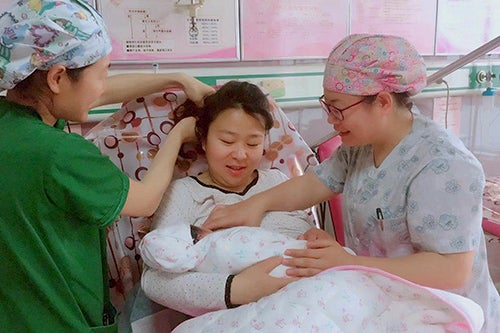News
Midwifery training helps doctors, nurses level up their skills in rural China
- 03 August 2021
News
YUSHU, China – Midwifery training is not just for midwives. In fact, many kinds of health professionals can have midwifery skills – the medical knowledge and techniques necessary to facilitate safe childbirth.
In Yushu County, part of China's northwest Qinghai Province, midwifery training is helping not only nurses and nurse-midwives, but even physicians, who say the training has improved their skills when providing sexual and reproductive health services.
“As a doctor working in the field, I carry out multiple tasks including attending births, procuring medicines and providing outpatient services such as cervical and breast cancer screening,” said Dr. Cairen Sangji, a Tibetan doctor at the Yushu County Maternal and Child Health Hospital.
Dr. Cairen had provided maternal health care in her community for 15 years before undertaking the national standardized midwifery training in 2020. Even after caring for pregnant and postpartum women for more than a decade, “I learned many professional skills that I did not know before,” she explained.
UNFPA has been working with partners in China, including the National Health Commission, Chinese Maternal and Child Health Association, and Peking University Health Science Centre, to improve access to dignified, rights-based sexual and reproductive health care, including services to ensure safe motherhood.
From 2016 to 2020, UNFPA supported midwifery education through a bachelor’s degree programme at eight medical universities, rolled out training programmes and initiated standardized midwifery training and testing. In China, where midwifery is not an independent profession but a set of specialized skills and knowledge, these efforts reached many kinds of medical professionals, including Dr. Cairen.

Dr. Cairen’s three-month standardized midwifery training course, in West China Second University Hospital of Sichuan University, taught her things that had not been covered in her earlier medical training, including skills to manage pregnancy complications.
“One new skill I mastered is administration of maternal anaesthesia for perineal muscle relaxation,” she said.
Patients with higher-risk pregnancies who previously would have been referred to costly specialist hospitals can now be treated in Dr. Cairen’s hospital. One recent 41-year-old patient benefited from the local availability of these services.
“If she can deliver successfully here and the cost is within 1,200 yuan [about $185], it will be fully covered by the government,” Dr. Cairen said of the patient. “In other words, it means free delivery.”
Li Tingting, a nurse, also received standardized midwifery training with support from UNFPA project, which was run in Qinghai and Shanxi, two less developed provinces. Nurse Li says the education has made her think more carefully about how to provide respectful care at her hospital in Linfen Prefecture, Shanxi Province.
“I am also a mother, and I know the difficulties that women face during labour,” she explained. “All the medical jargon and unfriendly attitudes can only intensify the situation and make a pregnant woman more anxious.”
She goes the extra mile to ensure patients are informed and comfortable. She was able to communicate continuously and reassuringly with one patient who had a hearing disability by using written notes, for example. “The better you care about her, the more she will cooperate with you, and the smoother the process will be,” she said. “A professional midwife shall be both as gentle and reliable as a neighbourhood sister, and as strong and calm as a powerful woman able to manage all situations.”
Graduates of the midwifery programme say they see the difference in their work -- and in the comfort of their patients. “I am now more confident with my skills for providing quality care, and more women are willing to deliver in our hospital,” Dr. Cairen said. “The more and better skills we have, the more women and families we can help.”